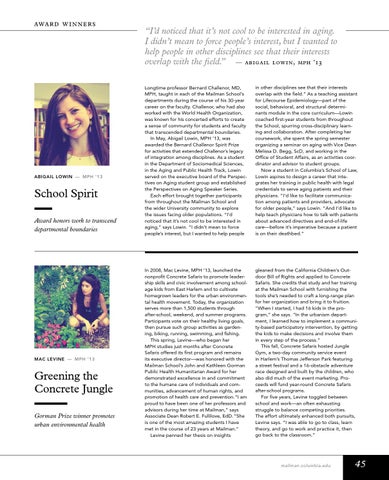awa r d w i n n e rs
ABIGAIL LOWIN — MPH ’13
School Spirit Award honors work to transcend departmental boundaries
MAC LEVINE — MPH ’13
Greening the Concrete Jungle Gorman Prize winner promotes urban environmental health
“I’d noticed that it’s not cool to be interested in aging. I didn’t mean to force people’s interest, but I wanted to help people in other disciplines see that their interests overlap with the field.” — Ab igail Lowin, MPH ’13 Longtime professor Bernard Challenor, MD, MPH, taught in each of the Mailman School’s departments during the course of his 30-year career on the faculty. Challenor, who had also worked with the World Health Organization, was known for his concerted efforts to create a sense of community for students and faculty that transcended departmental boundaries. In May, Abigail Lowin, MPH ’13, was awarded the Bernard Challenor Spirit Prize for activities that extended Challenor’s legacy of integration among disciplines. As a student in the Department of Sociomedical Sciences, in the Aging and Public Health Track, Lowin served on the executive board of the Perspectives on Aging student group and established the Perspectives on Aging Speaker Series. Each effort brought together participants from throughout the Mailman School and the wider University community to explore the issues facing older populations. “I’d noticed that it’s not cool to be interested in aging,” says Lowin. “I didn’t mean to force people’s interest, but I wanted to help people
in other disciplines see that their interests overlap with the field.” As a teaching assistant for Lifecourse Epidemiology—part of the social, behavioral, and structural determinants module in the core curriculum—Lowin coached first-year students from throughout the School, spurring cross-disciplinary learning and collaboration. After completing her coursework, she spent the spring semester organizing a seminar on aging with Vice Dean Melissa D. Begg, ScD, and working in the Office of Student Affairs, as an activities coordinator and advisor to student groups. Now a student in Columbia’s School of Law, Lowin aspires to design a career that integrates her training in public health with legal credentials to serve aging patients and their physicians. “I’d like to facilitate communication among patients and providers, advocate for older people,” says Lowin. “And I’d like to help teach physicians how to talk with patients about advanced directives and end-of-life care—before it’s imperative because a patient is on their deathbed.”
In 2008, Mac Levine, MPH ’13, launched the nonprofit Concrete Safaris to promote leadership skills and civic involvement among schoolage kids from East Harlem and to cultivate homegrown leaders for the urban environmental health movement. Today, the organization serves more than 1,500 students through after-school, weekend, and summer programs. Participants vote on their healthy living goals, then pursue such group activities as gardening, biking, running, swimming, and fishing. This spring, Levine—who began her MPH studies just months after Concrete Safaris offered its first program and remains its executive director—was honored with the Mailman School’s John and Kathleen Gorman Public Health Humanitarian Award for her demonstrated excellence in and commitment to the humane care of individuals and communities, advancement of human rights, and promotion of health care and prevention. “I am proud to have been one of her professors and advisors during her time at Mailman,” says Associate Dean Robert E. Fullilove, EdD. “She is one of the most amazing students I have met in the course of 23 years at Mailman.” Levine penned her thesis on insights
gleaned from the California Children’s Outdoor Bill of Rights and applied to Concrete Safaris. She credits that study and her training at the Mailman School with furnishing the tools she’s needed to craft a long-range plan for her organization and bring it to fruition. “When I started, I had 16 kids in the program,” she says. “In the urbanism department, I learned how to implement a community-based participatory intervention, by getting the kids to make decisions and involve them in every step of the process.” This fall, Concrete Safaris hosted Jungle Gym, a two-day community service event in Harlem’s Thomas Jefferson Park featuring a street festival and a 16-obstacle adventure race designed and built by the children, who also did much of the event marketing. Proceeds will fund year-round Concrete Safaris after-school programs. For five years, Levine toggled between school and work—an often exhausting struggle to balance competing priorities. The effort ultimately enhanced both pursuits, Levine says. “I was able to go to class, learn theory, and go to work and practice it, then go back to the classroom.”
mailman.columbia.edu
45
